 Petzlover
Petzlover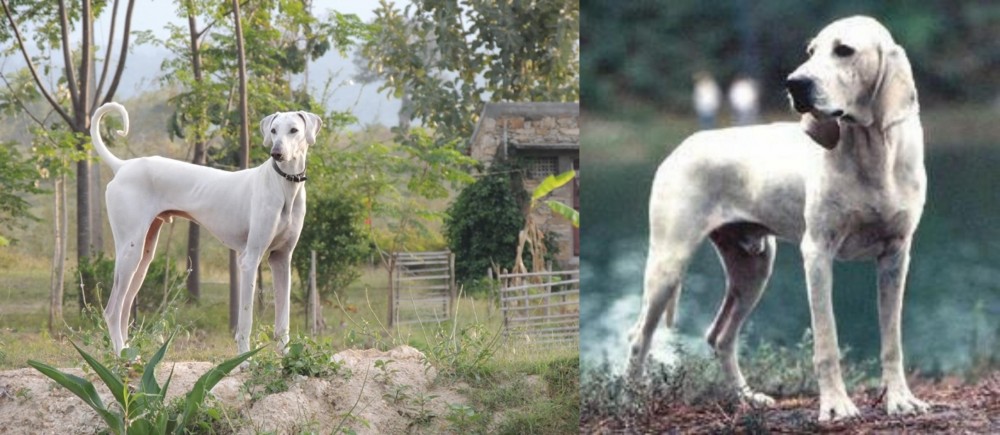 Chippiparai is originated from India but Porcelaine is originated from France. Both Chippiparai and Porcelaine are having almost same height. Chippiparai may weigh 8 kg / 17 pounds lesser than Porcelaine. Both Chippiparai and Porcelaine has almost same life span. Both Chippiparai and Porcelaine has same litter size. Both Chippiparai and Porcelaine requires Low Maintenance.
Chippiparai is originated from India but Porcelaine is originated from France. Both Chippiparai and Porcelaine are having almost same height. Chippiparai may weigh 8 kg / 17 pounds lesser than Porcelaine. Both Chippiparai and Porcelaine has almost same life span. Both Chippiparai and Porcelaine has same litter size. Both Chippiparai and Porcelaine requires Low Maintenance.
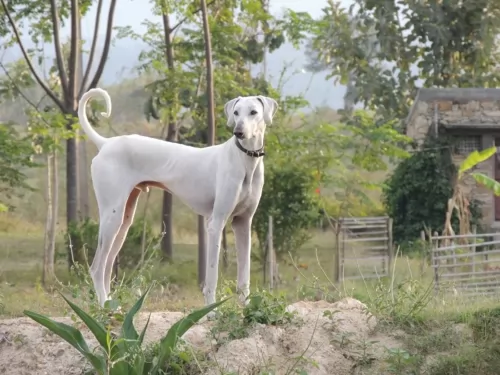 The Chippiparai is a working dog found in India and until recently there has been little interest in the purity of any breed, but rather only an emphasis on the abilities of the dog. They are only beginning to research the origin and history of their native dogs such as the Chippiparai. Not much is known about the origin of the breed except that it is found almost exclusively in Tamil Nadu and Keraia in the southern part of the subcontinent of India. Other than this there is much speculation about the breed’s origin but very little-known facts. It is indeed an ancient breed; however, its origin could be thousands of years ago or simply hundreds of years ago.
The Chippiparai is a working dog found in India and until recently there has been little interest in the purity of any breed, but rather only an emphasis on the abilities of the dog. They are only beginning to research the origin and history of their native dogs such as the Chippiparai. Not much is known about the origin of the breed except that it is found almost exclusively in Tamil Nadu and Keraia in the southern part of the subcontinent of India. Other than this there is much speculation about the breed’s origin but very little-known facts. It is indeed an ancient breed; however, its origin could be thousands of years ago or simply hundreds of years ago.
• Perhaps it is a descendant of the Saluki as it resembles this breed quite a bit. It has been believed for some time that the Saluki is the original sighthound and the source of all sighthound breeds. The Saluki was very popular in the Middle East, especially in Persia and Arabia from which it could easily have spread to India. It would then have been shared from Northern India to Southern India where the Chippiparai is found.
• Perhaps the Chippiparai is a descendent of sighthounds from Central Asia and Afghanistan – the Tazi, Taigan, Hortaya Borsaya or the Afghan Hound. This part of Central Asia had more trade, influence and contact with the Indian subcontinent early in their history than with any other region. The Chippiparai is considered by some to be more like these sighthounds than like the Saluki and the interaction between these regions has a much longer history than the Middle East and India.
• It is also speculated that the Chippiparai might have been developed completely and uniquely from the local street and working dogs. With the civilization of India being one of the oldest in the world, it is considered a possibility that the Chippiparai is the descendent of the Harappan hunting dogs that probably were developed by the Indus Valley or Harappa roiling class.
Wherever the Chippiparai came from, they were the exclusive property of the wealthy and ruling castes. These upper castes were the only ones that could legally hunt with dogs or afford to feed one. The royal classes of Tiruneivell, Thanjavur, and Madurai all fed the popularity of the breed among the upper castes. They were coursing dogs used to chase down the prey once it was sighted. The Chippiparai are incredibly fast runners and would catch almost any prey and either hold it or kill it for their hunter. The Chippiparai, when not hunting, had to be chained so they would not chase any small animal that they saw. This confinement also added to the purity of the breed as random breeding was prevented.
The southern part of the Indian subcontinent is extremely hot with routine temperatures over 100’. The Chippiparai was developed to withstand these extreme temperatures and is more heat tolerant than most any other breed. They also need very little food and are resistant to the many parasites and diseases found in southern India.
Harboring the belief that Indian dogs were not as good as European ones, the occupying countries of Portugal, France, and Britain, had no interest in the Chippiparai, again leaving the breed to develop naturally on their own with little or no interbreeding. They also received no formal recognition because Indian culture only valued the dog for its working abilities. There was no Indian Kennel Club until 1956.
The Chippiparai is now very rarely and only found in the area of its birth. Many believe the breed is in danger of becoming extinct and even though it is now registered with Indian Kennel Clubs it is not often shown in their dog shows. Lovers of the breed are now attempting to get Indians to recognize that the Chippiparai is a great companion animal and attempting to save the breed.
 The Porcelaine is an attractive dog hailing from France. It is thought to be the oldest of the French scent hounds.
The Porcelaine is an attractive dog hailing from France. It is thought to be the oldest of the French scent hounds.
The dog also goes by the name of Chien de Franche-Comté. The dogs were developed for hunting purposes. It is believed to be an ancient dog breed, dating way back to the 1700s.
It is thought that dogs used to bring about the Porcelain are the Talbot Hound, the English Harrier, the Montaimboeuf, as well as some smaller Laufhunds of Switzerland.
The Club du Porcelaine was established in France in 1971 and the breed was recognized by the FCI in 1975. It is a rare breed virtually unknown outside of France.
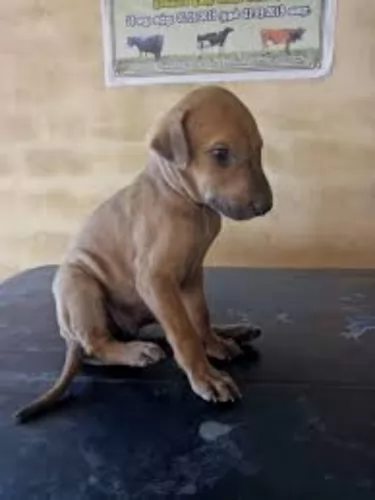 The Chippiparai is a typical sighthound although their size and appearance will vary more than that of registered purebred sighthounds. Typically, they will have a long, domed head with small erect ears and dark eyes. Their muzzle will be as deep and wide as the skull but longer. Their legs are straight and long, their chest is roached back and deep, giving them, an appearance very similar to a greyhound or other sighthound.
The Chippiparai is a typical sighthound although their size and appearance will vary more than that of registered purebred sighthounds. Typically, they will have a long, domed head with small erect ears and dark eyes. Their muzzle will be as deep and wide as the skull but longer. Their legs are straight and long, their chest is roached back and deep, giving them, an appearance very similar to a greyhound or other sighthound.
They have a long curly tail, and their coat can vary greatly in color. They are medium sized, and their coat is short, shiny and close. He is very slender and sleek, which along with his long legs gives him that incredible speed. They are thin with visible ribs.
 The Porcelaine has got such a gentle, amicable face that he looks like he wouldn’t hurt a fly.
The Porcelaine has got such a gentle, amicable face that he looks like he wouldn’t hurt a fly.
His interesting name comes from the fact that he has a shiny, gleaming single coat that looks like white porcelain.
He has a distinguished look to him with his slender neck, slender head with longish muzzle. The body is well proportioned, lean and muscular. Another noticeable feature of this dog is the long, floppy ears which can have a hint of orange. His nose is black and he has dark eyes and a long tail. He is a medium sized dog standing at between 53 to 58cm in height and weighs about 25 to 28kg.
Elegant and beautiful, the Porcelaine isn’t your usual looking dog. He is amicable and easy-going and always ready for a pat on the silky head.
His temperament, kindly and easy going, makes him the perfect pet for therapy purposes and for search and rescue work. He is a quiet, well behaved dog, indoors and out. He is an energetic dog and loves nothing more than a hunt and he has a keen sense of smell.
He loves being outdoors but is such a good friend of yours he can happily turn into a couch potato to be by your side.
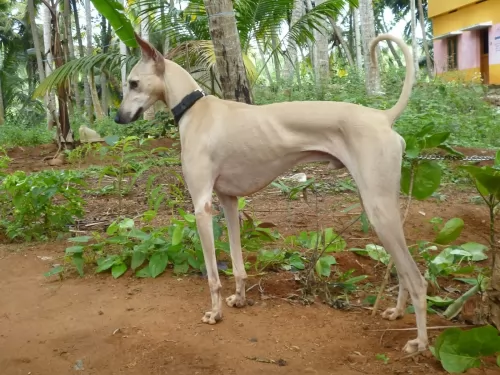 The Chippiparai is a loving, gentle family dog if well socialized, well trained and well exercised. They are very intelligent and need human companionship. Once they are living with a human family, they are very protective of that family. They are for the most part peaceful and quiet dogs. They are loyal and loving but they are not overly affectionate. Cuddlers they are not, and they do not like to play rough with children.
The Chippiparai is a loving, gentle family dog if well socialized, well trained and well exercised. They are very intelligent and need human companionship. Once they are living with a human family, they are very protective of that family. They are for the most part peaceful and quiet dogs. They are loyal and loving but they are not overly affectionate. Cuddlers they are not, and they do not like to play rough with children.
Accepting and loving within the family, the Chippiparai are equally hesitant and shy around strangers. They can be suspicious, but they are not aggressive. They are just very aloof with strangers, yet they hardly ever bark.
 The Porcelaine is a working, hunting dog but he is more than willing to become a companion animal, being loving and loyal to his human family.
The Porcelaine is a working, hunting dog but he is more than willing to become a companion animal, being loving and loyal to his human family.
He is a balanced, kind natured dog and can get on well with children and with pets in the home.
He enjoys his human family, and typical of hounds he is friendly, energetic and amusing. Bring this beautiful white dog into your home and start a wonderful, long, loving friendship with him.
 There are no clinical studies regarding the health and health history of the Chippiparai, so little is known about their long-term health. However, most who know the breed, believe it is an incredibly healthy one. They seem to have a lot less genetically transmitted health issues than other purebreds. Because of their isolation for centuries in India, they have developed immunities and resistance to most parasites and diseases other dog suffer from.
There are no clinical studies regarding the health and health history of the Chippiparai, so little is known about their long-term health. However, most who know the breed, believe it is an incredibly healthy one. They seem to have a lot less genetically transmitted health issues than other purebreds. Because of their isolation for centuries in India, they have developed immunities and resistance to most parasites and diseases other dog suffer from.
Because of this you should look for the types of issues that occur in dogs of this size and build. Have them tested by the Canine Eye Registration Foundation and the Orthopedic Foundation for Animals.
 The Porcelaine has so many good features, and good health is one. He is described as a truly healthy breed that can easily reach up to 14 years of age with good care.
The Porcelaine has so many good features, and good health is one. He is described as a truly healthy breed that can easily reach up to 14 years of age with good care.
As a Porcelaine owner, look out for some of the more common heath conditions such as cancer, bloat and skin infections.
A working, hunting type dog such as the Porcelaine can be devastated with hip dysplasia. It’s a disease that can be genetically passed on and if your dog has it,it should be spayed or neutered. The condition, where your pet becomes more and more reluctant to participate in exercise can be painful and debilitating.
There are different treatments available for pain relief and mobility.
The long, floppy ears of the Porcelaine can result in a tendency towards ear infections. Ear infections can be painful and frustrating and you’ll see your dog scratching his ears and shaking his head. The ears may be red inside and there may even be a discharge. Don’t allow your pet to suffer and get him to the vet.
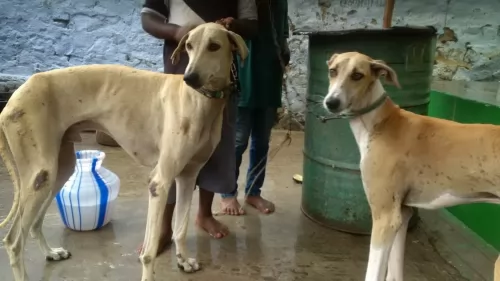 Do not overfeed your Chippiparai. Feed twice a day and no more than a total of 2.5 cups of high quality dry food.
Do not overfeed your Chippiparai. Feed twice a day and no more than a total of 2.5 cups of high quality dry food.
As mentioned previously the Chippiparai seems to have no genetic diseases or issues and very few acquired ones. However, he is sensitive to anesthesia and some foods. He is intolerant to cold weather and has a hard time with his pads on hard surfaces. Some Chippiparai might experience some of the ailments other breeds like them experience.
Both Elbow and hip are possible. This can cause arthritis and lameness. This occurs when the bone does not fit well into the joint.
This can cause lameness as well. The kneecaps slide over the knee instead of staying in place.
This is a hunting dog and he will want to hunt. They are incredibly fast and need the opportunity to run. Brisk walks will not be enough for this dog. He is very energetic. They will chase any small animals. It is not recommended that you have small pets even small dogs or cats with a Chippiparai. Having been bred for centuries to hunt, they are not likely to respond to any commands if they are off lease and chasing prey. Do not allow them to be off leash unless in a fenced area, and that fence needs to be 8 feet tall as they can easily jump a seven-foot fence. Try they at coursing, agility, fly ball and frisbee competitions.
 Porcelaines have a very high activity level and require lots of exercise - ball games and walks. Because of this, they aren't recommended for people living in small homes in the city. He will ideally suit life on a big property.
Porcelaines have a very high activity level and require lots of exercise - ball games and walks. Because of this, they aren't recommended for people living in small homes in the city. He will ideally suit life on a big property.
The Porcelaine Dog is a single coated dog with very short hair and is looked upon as being pretty low maintenance.
Apart from brushing him twice a week, to keep the coat shiny and healthy, wipe him down with a hound mitt to get rid of loose hairs and to remove dust.
Because of the long, floppy ears, clean the insides very gently to avoid dirt, moisture and wax buildup. There are veterinarian-recommended ear cleansers, but if you don’t like the idea of doing it yourself, the vet or groomer will do it for you when you take him to have his nails clipped.
Your beautiful Porcelaine dog needs the very best food there is so as to ensure he remains the healthy, shiny, lean specimen he is.
He can live a long, healthy life if you choose quality dog food packed with the right mix of vitamins and minerals. If you buy commercially manufactured dog food for him, it needs to be the high quality ones to ensure its properly formulated.
Your Porcelaine, like any other dog, wants consistency and simplicity. Home-made food is always an excellent choice for your pet’s diet. Boiled chicken, brown rice or pasta and spinach, sweet potatoes and carrots can be very healthy for him.
Chop it up and add it into the dry kibble a couple of times a week. Its providing him with some variety from the dry kibble and gives him a tasty treat.
Some raw meat added in occasionally will also ensure his coat and eyes remain bright and vibrant. Always make sure he has access to fresh, cool water.